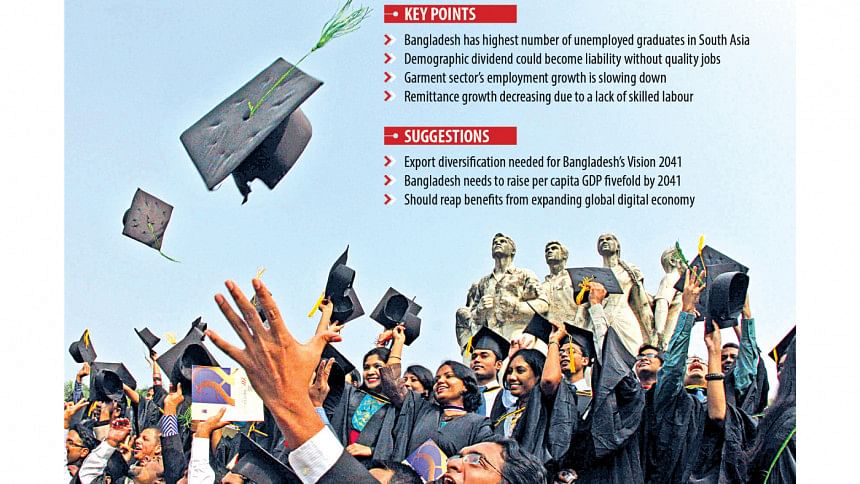Demographic dividend may turn into a liability

The demographic dividend that Bangladesh currently enjoys could turn into a liability if an adequate number and quality jobs are not created, according to experts.
"Another important factor for the country to address is unemployment among youth, particularly educated youth," said M Masrur Reaz, chairman and CEO of the Policy Exchange of Bangladesh.
At present, Bangladesh has the highest number of unemployed tertiary graduates in all of South Asia.
"This is not great news for a country that has a good demographic dividend. Unless we address policy issues and create openings for jobs, the demographic dividend might become a liability," he added.
Reaz made these remarks while presenting the keynote speech at a conference, styled "Resilient and resurgent Bangladesh: Sustaining economic growth in a changing climate".
The event was organised by the International Growth Centre (IGC) at InterContinental Dhaka yesterday.
He said it will take economic diversification and expansion of formal gainful employment to realise "Vision 2041", which aspires to see Bangladesh become a developed country by that year.
But to become a developed country, Bangladesh's gross domestic product (GDP) per capita needs to increase nearly five-fold from $2,800 to $12,996.
Meanwhile, private investment needs to rise from 21 per cent of the GDP at present to 36 per cent.
Besides, the total volume of private investment needs to expand by about 70 per cent from the existing $70 billion to $955 billion.
Additionally, foreign direct investment and exports will have to be raised by 600 per cent and 900 per cent respectively.
"This has implications for jobs, both in terms of demand and supply. If we have to deliver that economic target, we need to ensure enough human capital is present to support the growth rate," Reaz said.
"As we edge closer to those targets, it is expected that gainful and quality employment opportunities will be created if guided by the right policies and governance," he added.
Reaz also said the ability to create jobs is weaning even in the garments industry, the country's principal manufacturing and export sector.
And as employment growth in the sector is slowing significantly, the country needs to find other sustainable industries that are globally integrated to lessen the burden on garments.
"Is Bangladesh doing good in this regard? Not really as diversification remains elusive even after at least a decade of heavy discussion," he added.
Garments account for about 84 per cent of the country's total exports. Recent government data on export figures for fiscal 2022-23 show that 94 per cent of all exports that year comprised just five products.
"And if you look at new products exported to new markets, they usually accounted for 1 per cent in the last 10 years, indicating how the diversification agenda is struggling as well as the policy attention it requires," Reaz said.
"Because without that, it is going to be very difficult for Bangladesh to get the necessary number and quality jobs it requires," he added.
Reaz also suggested the country could reap benefits from the digital economy that is expanding globally in terms of job creation.
Ahsan H Mansur, executive director of the Policy Research Institute of Bangladesh, said the country has been doing well across various economic sectors for the past few years.
"But we are still lagging behind other developing and competing countries. Especially due to Covid-19 and the Russia-Ukraine war, the economy is going through a turbulent situation," he said.
But these external factors are also responsible for internal political decisions, Mansur added.
Mansur also said that two main sectors of Bangladesh's economic growth are garment exports and expatriate income.
But in the last two decades, no other export sector has been able generate export earnings equal to that of garments.
"Also, expatriate income is coming down as we are not able to send skilled people abroad," he added.
Mansur pointed out that the tax-GDP ratio is decreasing rather than increasing while there is no discipline in the banking sector.
"And excessive fuel costs are reducing our competitiveness in the global market. All in all, such a situation cannot be called sustainable," he added.
Jonathan Leape, executive director of the IGC, also spoke.

 For all latest news, follow The Daily Star's Google News channel.
For all latest news, follow The Daily Star's Google News channel. 



Comments